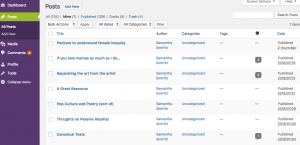I am posting a couple of articles about metaphor. The first is more accessible, it brings out how we use metaphors in daily life. The second is by Nietzsche and is a really interesting theoretical take on language, its origin and so on. It talks about how all language is based on a metaphorical not literal use of words–it is one of my favourites of his and I would recommend it highly if you are interested in that kind of thing even if you haven’t read much philosophy.
A note on the opening of R & J
I wanted to say that I think it’s true that Samson and Gregory are far from paragons of feminism but I think the text intends to show them that way–we didn’t get into things in class so I’m not really arguing against anyone’s opinion in particular, I only want to set things out a bit. The two are not stand ins for Shakespeare nor exactly the most privileged. They are uneducated servants, albeit of a wealthy family. The play really moves back and forth from high to low. It starts with the prelude, which is serious in tone before Gregory and Samson’s exchange, and it goes up and down. I think this is because an audience would be resistant to listening to a more high-minded and earnest drama throughout and placing the low over against the high is an effective way to show the contrast between perspectives. Romeo, in the balcony scene (at least according to Luhrmann’s movie) isn’t even thinking about sleeping with Juliet and only has his eyes set on marriage. In any case, I think whatever interpretation is given to the text, the opening dialogue can still be used as an opening to discuss attitudes toward sexuality etc. Juliet is also given a choice of who to marry early on but later her father seems to change his mind and requires her to act according with his wishes. There are a lot of interesting dynamics ongoing. I definitely think this play is worth talking about in the context that it was discussed in class the other day.
Harry Potter Podcast!!! Deconstructing beloved yet problematic texts
Hi!
I wanted to send out a recommendation for an AWESOME podcast that looks at Harry Potter from a critical yet adoring lens. It’s called Witch Please. http://ohwitchplease.ca/ The poem we looked at a few weeks ago, “Dear JK Rowling, From Cho Chang” made me think of this as well as when we talked about critically looking at texts in Brooke’s presentation on Everything, Everything. Harry Potter is something that I was raised on and love for many reasons, but also something I am quite critical of. I think it is important to help students understand that you can be drawn to something and still find flaws in it, and how looking at these flaws can help deconstruct some of the problematic societal constructs and structures that are perpetuated through our art and literature.
The podcast is hilarious and made me think through all of the books and movies in such an interesting way. I might not bring it into the classroom, maybe moments within it in, just because the language used is sometimes university level (they’re professors), but I would definitely recommend it for a template on how to deconstruct beloved yet problematic literature. That, and it’s just super fun and interesting.
Angela Carter – Alternative Fairy Tales
Hello all!
Here is the good reads link to the book I mentioned in class today. Angela Carter is one of my favourite writers and her alternative fairy tales are both beautiful, dark and rich texts to draw from.
Note: Not all of the stories in the collection are necessarily appropriate for a high school audience (sexual content, upper reading level) but some of them would work great, or even passages, in a text set.
Does anyone have any other texts you think would pair well with the idea of “alternative fairy tales”? I love fairy/folk tales and am thinking of doing a unit on them for my grade 7 ELA class.
https://www.goodreads.com/book/show/49011.The_Bloody_Chamber_and_Other_Stories
Trauma Text Stations
I enjoyed the text stations that we did today because these topics were uncomfortable for me to talk about. Just listen to others’ interpretations and thoughts about the texts were fruitful for my learning. I think simple forms of these lit/text circles for engaging younger students to share their thoughts. Instead of sharing their thoughts, I thought that students could choose to draw their feelings or choose an emotion out of a list of emotions and describe it.
Blog Post/Comment Contributions
You can check your posts by clicking on the “Posts” button that leads you to the page and then you can check your comments by using the search function in the “Comments” page.
Here it is with some images:
to check comments
this is your dashboard:

click on the “posts” button, or hover then click “all posts” (both lead you to the same page:

here’s what the page looks like:

to check comments
click on the comments tab:

use the search function near the top righthand to put your first or last name:

your comments will pop up!
Podcast to understand female inequity
This resource just kind of fell into my lap… I finished listening to The Ezra Klein Show‘s The Green Pill (which is an amazing podcast about the (sort of) history of why we eat what we eat and ethical implications [it’s really good!!!!]) on the weekend, and this was was the first podcast to play after it-I had forgotten that I had downloaded it a while ago.
Anyway, the episode is called “Rebecca Traister on #MeToo, female rage, and Anita Hill’s legacy” and it is amazing. It’s in an American context, but with the amount of political American content we’re inundated with, I think it’s valuable; also, gender inequity and sexual harassment is also thriving in Canada. I’m only halfway through, but I think I would bring this (or snippets) into my classroom. Rebecca is very well spoken and articulate and I appreciate her thoughts and honesty. Additionally, Ezra is male and gives voice to some questions that we all may have.
Satire
I came across this article in the NY Times, an opinion piece by Larry David who made Curb Your Enthusiasm and Seinfeld. I thought it was pretty funny and could be used as part of a satire lesson or unit. I know a lot of people are against Trump but this is a nice support piece…
I’m attaching it as a word doc below in case you can’t access NYT.
6-word stories and Indigenous ways of knowing
I have been thinking about how the 6 word stories could be used to introduce Indigenous ways of knowing in storytelling. Specifically I was thinking about using this well teaching The Marrow Thieves and introducing the discussion around storytelling, protocols surrounding indigenous culture, and actually the importance of oral storytelling in Indigenous cultures.
I was thinking you could do this by using this activity, having students write their 6-word story that sums up “who they are”. Then have them share this 6-word story with a partner. Then have them discuss as a class the challenges and merits of having to sum yourself up in 6 words. What aspects of their identity and story were portrayed in the story? What was missing? When we’re trying to tell the story of who we are what is it important to include? Is how we tell this story important? What protocols would surround telling your own story? (who you would tell it to, when, where, etc)
In this way I would use this activity to catapult this discussion. Also this could be a way to talk about this storytelling in a personal way for your students without necessarily having to reveal their stories and experiences that they may not wish to share.
Bringing Picture Books to the Classroom
I’m a big fan of bringing picture books into the classroom. To me, they’re a way to ease in a heavy (or even light) theme. On my practicum, I was a witness to that! But I also found some difficulty.
I had two blocks of English 8: one was a polite and eager group, the other was a… less polite and less eager group. I read them The Giving Tree by Shel Silverstein. The former class was fully engaged and hanging onto every word and the latter class was languishing from being subjected to literature that was ‘beneath’ them.
Like a lot of things, it works and sometimes it doesn’t! It’s got me thinking about classroom personalities and how differently some need to be engaged.
